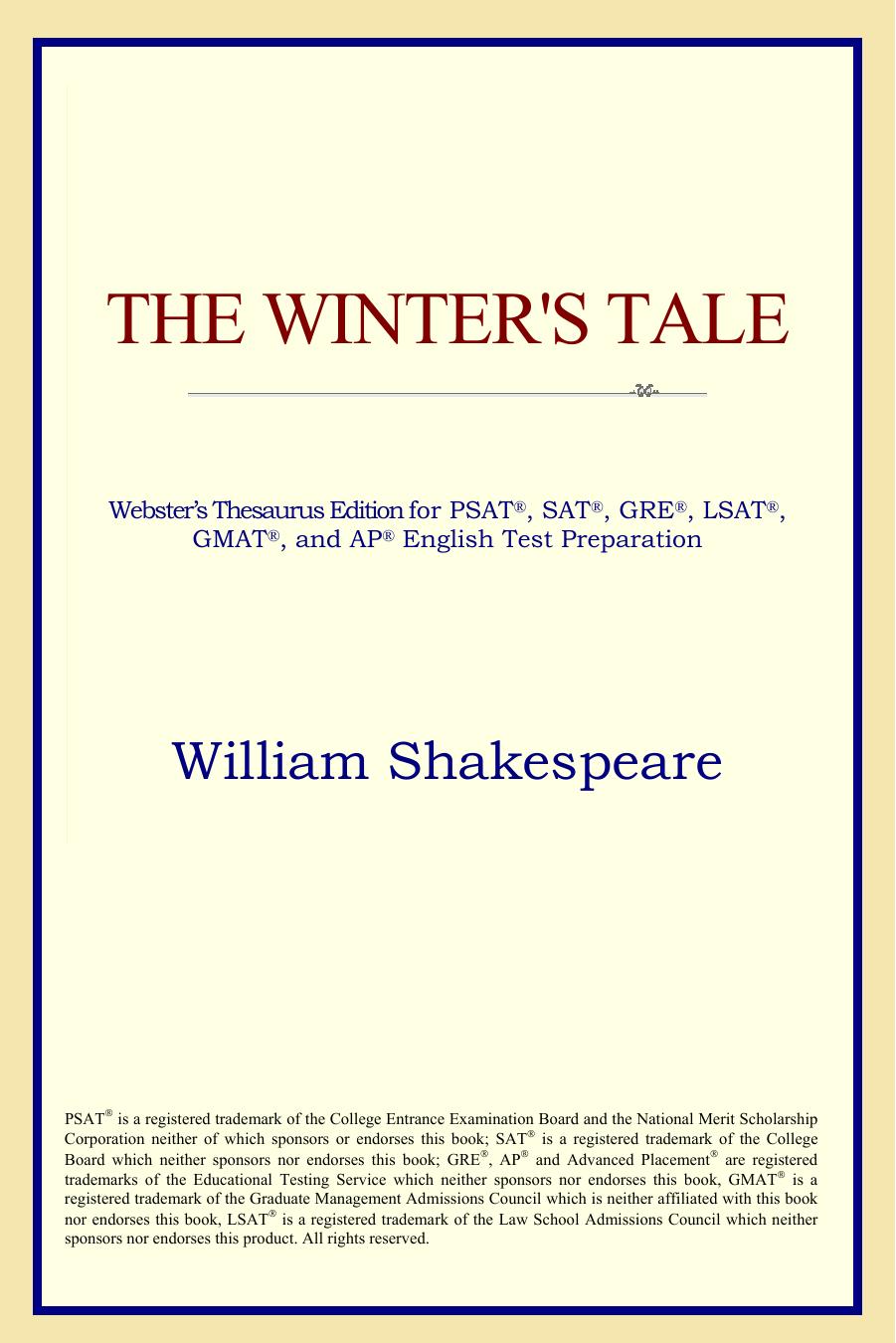The Winter's Tale by William Shakespeare

Author:William Shakespeare [Shakespeare, William]
Language: eng
Format: epub, mobi, pdf
Publisher: Penguin USA, Inc.
Published: 2011-06-30T10:51:12+00:00
maids; it was thought she was a woman, and was turned into a cold fish for she would not exchange flesh with one that loved her. The ballad is very pitiful, and as true.
Dorcas. Is it true too, think you?
Autolycus. Five justices’ hands at it, and witnesses more than my pack will hold.
Clown. Lay it by too; another.
Autolycus. This is a merry ballad, but a very pretty one.
Mopsa. Let’s have some merry ones.
Autolycus. Why, this is a passing merry one, and goes to the tune of “Two Maids Wooing a Man.” There’s scarce a maid westward but she sings it; ’tis in request, I can tell you.
Mopsa. We can both sing it. If thou ’lt bear a part, thou shalt hear; ’tis in three parts.
Dorcas. We had the tune on ’t, a month ago. Autolycus. I can bear my part, you must know ’tis my occupation. Have at it with you.
Song.
Autolycus. Get you hence, for I must go Where it fits not you to know.
Dorcas. Whither?
Mopsa. O whither?
Dorcas. Whither?
Mopsa. It becomes thy oath full well, Thou to me thy secrets tell.
Dorcas. Me too; let me go thither.
Mopsa. Or thou go’st to th’ grange or mill,
Dorcas. If to either thou dost ill.
Autolycus. Neither.
Dorcas. What, neither?
Autolycus. Neither.
Dorcas. Thou hast sworn my love to be.
Mopsa. Thou hast sworn it more to me. Then whither goest? Say, whither?
Clown. We’ll have this song out anon by ourselves; my father and the gentlemen are in sad° talk, and we’ll not trouble them. Come bring away thy pack after me; wenches, I’ll buy for you both. Peddler, let’s have the first choice; follow me, girls.
[Exeunt Clown, Dorcas, and Mopsa.]
Autolycus. And you shall pay well for ’em. Song.
Will you buy any tape, or lace for your cape, My dainty duck, my dear-a?
Any silk, any thread, any toys for your head, Of the new’st, and fin’st fin’st wear-a?
Come to the peddler, money’s a meddler, That doth utter° all men’s ware-a.
Exit.
Enter Servant.
Servant. Master, there is three carters, three shepherds, three neatherds,° three swineherds that have made themselves all men of hair;° they call themselves saltiers,° and they have a dance, which the wenches say is a gallimaufry° of gambols, because they are not in ’t; but they themselves are o’ th’ mind, if it be not too rough for some that know little but bowling,° it will please plentifully.
Shepherd. Away! We’ll none on ’t; here has been too much homely foolery already. I know, sir, we weary you.
Polixenes. You weary those that refresh us; pray let’s see these four threes of herdsmen.
317 sad serious 327 utter put forth 329 neatherds cowherds 330 men of hair hairy men, satyrs (or the wild men of medieval art and entertainment) 331 saltiers, satyrs (or perhaps leapers, vaulters, from Fr. saultier, “vaulter”) 332 gallimaufry hodgepodge 335 bowling (here, a gentle activity, contrasted with the acrobatic dance)
Download
The Winter's Tale by William Shakespeare.mobi
The Winter's Tale by William Shakespeare.pdf
This site does not store any files on its server. We only index and link to content provided by other sites. Please contact the content providers to delete copyright contents if any and email us, we'll remove relevant links or contents immediately.
| Ancient & Classical | Anthologies |
| British & Irish | Children's |
| Comedy | LGBT |
| Medieval | Regional & Cultural |
| Religious & Liturgical | Shakespeare |
| Tragedy | United States |
| Women Authors |
Cecilia; Or, Memoirs of an Heiress — Volume 2 by Fanny Burney(31951)
Cecilia; Or, Memoirs of an Heiress — Volume 3 by Fanny Burney(31935)
Dialogue by Robert McKee(4392)
The 101 Dalmatians by Dodie Smith(3507)
Bound by Hatred (The Singham Bloodlines Book 2) by MV Kasi(3082)
The Art of Dramatic Writing: Its Basis in the Creative Interpretation of Human Motives by Egri Lajos(3064)
Harry Potter and the Cursed Child - Parts One and Two by John Tiffany(3040)
The Beautiful Boys: A High School NA Reverse Harem Paranormal Bully Romance (Shadowlight Academy Book 1) by Gow Kailin(2864)
Angels in America by Tony Kushner(2657)
Carrie's War by Nina Bawden(2466)
A Clockwork Orange by Anthony Burgess(2459)
Unlaced by Jaci Burton & Jasmine Haynes & Joey W. Hill & Denise Rossetti(2371)
The Femme Playlist & I Cannot Lie to the Stars That Made Me by Catherine Hernandez(2291)
Open Book by Jessica Simpson(2262)
Drama by John Lithgow(2230)
Outside Woman (BWWM Amish Romance) by Stacy-Deanne(2118)
Terrorist Cop by Mordecai Dzikansky & ROBERT SLATER(2073)
Yerma by Federico García Lorca(2063)
Leo's Desire by Sundari Venkatraman(1930)
